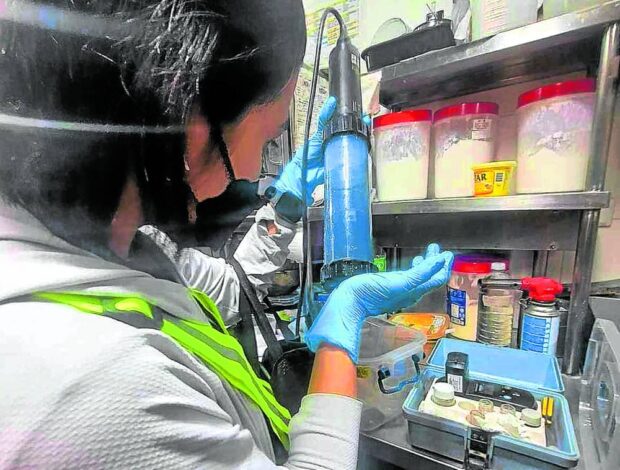Gastro cases breach 2,000 in Baguio

TRACING CAUSE A worker from the Baguio City health office checks a water sample for contaminants as the local government tries to establish the cause of the outbreak of acute gastroenteritis and diarrhea in the summer capital. —PHOTO COURTESY OF BAGUIO CITY HEALTH OFFICE
BAGUIO CITY — Despite the declaration of an outbreak of acute gastroenteritis (stomach flu) that has already afflicted 2,199 people in this city, local business establishments continue to operate without major disruptions.
In an interview on Thursday, hotel owner Peter Ng said they trusted that the city government would contain the outbreak, which he described as a “minor” event that had a “minimal” impact on most businesses.
READ: Gastroenteritis outbreak declared in Baguio
Small food retailers along Sandico Street outside the central business district shared Ng’s observation, saying they have not lost customers.
Ng, owner of Hotel Supreme, said booking inquiries have not stopped despite Mayor Benjamin Magalong’s declaration of an outbreak on Wednesday after government doctors concluded that the spike in acute gastroenteritis and diarrhea cases in the past 10 days had been high.
At a briefing on Wednesday, Dr. Donnabel Tubera-Panes, the city epidemiologist, said Baguio suffered through two similar outbreaks in the past when cases breached the 1,000 mark.
Article continues after this advertisementAccording to Magalong, the outbreak declaration would be lifted once the number of infections dropped significantly and once they narrowed down its source.
Article continues after this advertisementContamination
A laboratory result released on Wednesday detected fecal material in one sample, but no further details had been released at press time on Thursday.
The city information office said 28 samples were subjected to tests and 16 of them did not contain coliform. But the 16 samples will be submitted for viral testing at the Research Institute for Tropical Medicine in Metro Manila.
The Department of Health (DOH) is not ruling out contaminated food as another possible cause of the surge in cases of diarrhea and acute gastroenteritis in Baguio.
DOH deputy spokesperson Albert Domingo confirmed to the Inquirer that initial findings of the investigation into the outbreak pointed to contamination of water sources “from one sampling point.”
However, Domingo said that the “DOH and Baguio City [officials] are looking at all possible reasons for the increase in diarrhea cases, including, among others, foodborne causes.”
As the epidemiologic investigation remains underway, Domingo pointed out that the DOH could “not form a conclusion” pending results from other samples.
In a statement on Thursday, the DOH noted that diarrhea, or loose and watery stools, is commonly “associated with either water or food-borne causative agents.”
Gastroenteritis, or inflammation of the stomach and intestines, on the other hand, may cause diarrhea and vomiting.
Laboratory tests issued on Tuesday had not detected coliform in the water distributed to downtown Baguio by the Baguio Water District.
The city government had deployed an epidemiological team of sanitation engineers, medical workers and police to visit people who complained of diarrhea and vomiting the week before and during the New Year’s Day holiday week when Baguio was deluged with visitors.
The teams have also been dispatched to gather water samples from restaurants and eateries where the highest concentration of customers allegedly suffered diarrhea. Around 80 of these establishments, including coffee shops, are operating in a local shopping mall.
According to city doctors, 63.6 percent (about 1,399 of the 2,199 recorded patients so far) suffered stomach flu after dining out, while 13.2 percent (or 290) consumed delivered food.
The data showed 11.2 percent (about 246) of them ate home-cooked meals while the remaining 12 percent (263) indicated they suffered diarrhea under “other circumstances.”
At least 218 patients were not from Baguio and were possibly tourists or transient businessmen, the tally showed. The city tracked 204 of the patients to neighboring Benguet towns.
Precautions
In earlier statements, Magalong advised the public against drinking tap water and to consume only bottled water sold in groceries or purified water delivered by accredited water stations.
He also reminded the public to continue washing their hands, a protocol during the COVID-19 pandemic.
The DOH urged Baguio households to report to health authorities “any change in color or odor of their tap water.”
“Pending [the] final results of the ongoing epidemiologic investigation, the public in affected areas will be provided access to clean, potable water,” it said.
To ensure that the drinking water to be consumed is safe, the DOH advised that water be boiled for two minutes. Residents may also get chlorine-based water disinfection or tablets at health centers, it said.
The health agency also reminded the public to “always use clean water for drinking, preparing drinks, cooking, washing, eating and cooking utensils, brushing teeth, and washing the hands and face.”
“In case of loose or watery stools, the first aid is to ensure hydration. Drink replacement fluids—clean water, ideally with oral rehydration solution,” the DOH said.